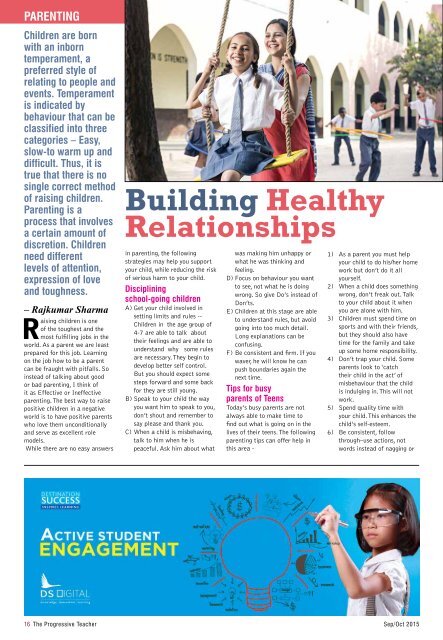The Progressive Teacher Vol 02 Issue 04
This issue of The Progressive Teacher focuses on "Teaching- Emotional Fulfillment and Self-Actualisation". The magazine provides guidance to the teachers by their peers and school leaders for tackling challenges with innovative ideas. Happy Reading!
This issue of The Progressive Teacher focuses on "Teaching- Emotional Fulfillment and Self-Actualisation". The magazine provides guidance to the teachers by their peers and school leaders for tackling challenges with innovative ideas. Happy Reading!
Create successful ePaper yourself
Turn your PDF publications into a flip-book with our unique Google optimized e-Paper software.
parenting<br />
Children are born<br />
with an inborn<br />
temperament, a<br />
preferred style of<br />
relating to people and<br />
events. Temperament<br />
is indicated by<br />
behaviour that can be<br />
classified into three<br />
categories – Easy,<br />
slow-to warm up and<br />
difficult. Thus, it is<br />
true that there is no<br />
single correct method<br />
of raising children.<br />
Parenting is a<br />
process that involves<br />
a certain amount of<br />
discretion. Children<br />
need different<br />
levels of attention,<br />
expression of love<br />
and toughness.<br />
– Rajkumar Sharma<br />
Raising children is one<br />
of the toughest and the<br />
most fulfilling jobs in the<br />
world. As a parent we are least<br />
prepared for this job. Learning<br />
on the job how to be a parent<br />
can be fraught with pitfalls. So<br />
instead of talking about good<br />
or bad parenting, I think of<br />
it as Effective or Ineffective<br />
parenting. <strong>The</strong> best way to raise<br />
positive children in a negative<br />
world is to have positive parents<br />
who love them unconditionally<br />
and serve as excellent role<br />
models.<br />
While there are no easy answers<br />
Building Healthy<br />
Relationships<br />
in parenting, the following<br />
strategies may help you support<br />
your child, while reducing the risk<br />
of serious harm to your child.<br />
Disciplining<br />
school-going children<br />
A) Get your child involved in<br />
setting limits and rules --<br />
Children in the age group of<br />
4-7 are able to talk about<br />
their feelings and are able to<br />
understand why some rules<br />
are necessary. <strong>The</strong>y begin to<br />
develop better self control.<br />
But you should expect some<br />
steps forward and some back<br />
for they are still young.<br />
B) Speak to your child the way<br />
you want him to speak to you,<br />
don’t shout and remember to<br />
say please and thank you.<br />
C) When a child is misbehaving,<br />
talk to him when he is<br />
peaceful. Ask him about what<br />
was making him unhappy or<br />
what he was thinking and<br />
feeling.<br />
D) Focus on behaviour you want<br />
to see, not what he is doing<br />
wrong. So give Do’s instead of<br />
Don’ts.<br />
E) Children at this stage are able<br />
to understand rules, but avoid<br />
going into too much detail.<br />
Long explanations can be<br />
confusing.<br />
F) Be consistent and firm. If you<br />
waver, he will know he can<br />
push boundaries again the<br />
next time.<br />
Tips for busy<br />
parents of Teens<br />
Today’s busy parents are not<br />
always able to make time to<br />
find out what is going on in the<br />
lives of their teens. <strong>The</strong> following<br />
parenting tips can offer help in<br />
this area -<br />
1) As a parent you must help<br />
your child to do his/her home<br />
work but don’t do it all<br />
yourself.<br />
2) When a child does something<br />
wrong, don’t freak out. Talk<br />
to your child about it when<br />
you are alone with him.<br />
3) Children must spend time on<br />
sports and with their friends,<br />
but they should also have<br />
time for the family and take<br />
up some home responsibility.<br />
4) Don’t trap your child. Some<br />
parents look to ‘catch<br />
their child in the act’ of<br />
misbehaviour that the child<br />
is indulging in. This will not<br />
work.<br />
5) Spend quality time with<br />
your child. This enhances the<br />
child’s self-esteem.<br />
6) Be consistent, follow<br />
through–use actions, not<br />
words instead of nagging or<br />
16 <strong>The</strong> <strong>Progressive</strong> <strong>Teacher</strong> Sep/Oct 2015


















